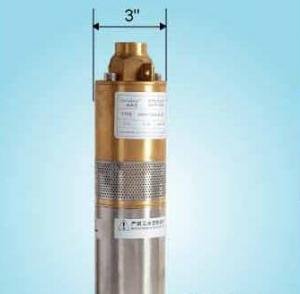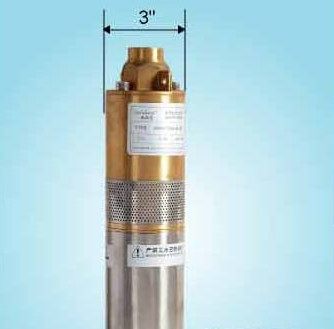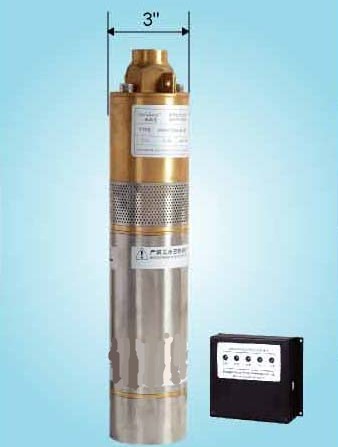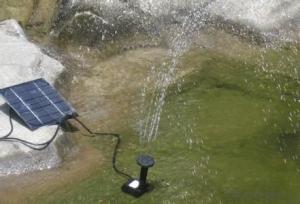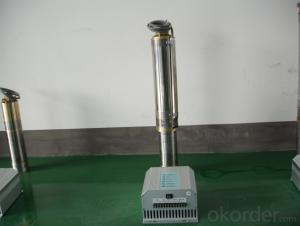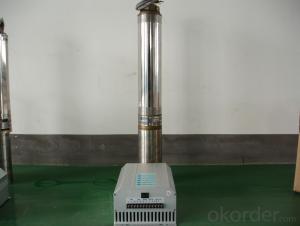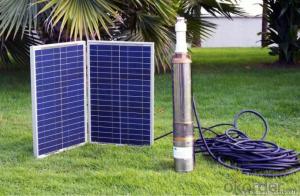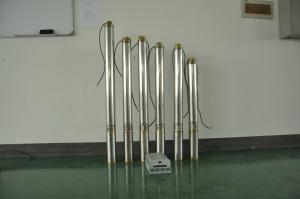1 Hp Solar Pump Price | Long Service Life Solar Pump SHP 6/105-300
- Loading Port:
- Shanghai
- Payment Terms:
- TT or LC
- Min Order Qty:
- 1 unit
- Supply Capability:
- 10000 unit/month
OKorder Service Pledge
OKorder Financial Service
You Might Also Like
Solar Pump is a pumping device powered by solar energy, which consists of solar pumping inverter and pump, and is mainly applied to agricultural irrigation, desert control, pasture animal husbandry, city waterscape, seawater desalination and fresh water supply, etc.
Features: High efficiency& High reliability
Driven by PM. Brushless DC Motor
Minimum maintenance, long life& without watching
Powered by PV/Wind/Battery
All the necessary production
Environment friendly materials, lubricate without oil
Applications:
Village or family water supply
Animal drinking water and lives tock watering
Garden/Countryard Irrigation
Natatorinm/swimming pool
Water supply for bivouac or camping car
Water supply for remote areas
Automatic Control:
Operate automatically & without watching
Protected from dry operation
Maximal Power Point Tracking (MPPT)
Protected from dry operation
New Technology
Application Innovation
The DC PM brushless motor has increased its efficiency up to 25% in comparison with traditional small asynchronous motor-25% PV Modules could be saved.
Technology Innovation(Patent)
Stator and rotor are sealed by environment friendly casting resin. The motor’s insulation resistance can be hold higher than 300MΩ, for more than 10 years. I t consumedly increased the security and reliability of the submersible motor.
Structure Novelty
Casting resin technology processed stator and rotao as well as the water lubricated bearing make the submersible pump environment friendly(no even one glob oil), easy to install and more reliability.
Solar Pump Specifications
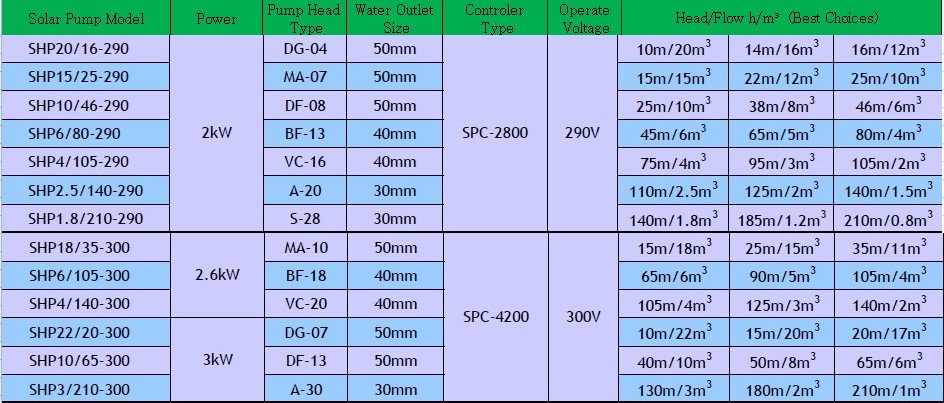
- Q: How long does a solar pump typically last?
- A solar pump typically lasts for about 20 to 25 years, depending on the quality of the equipment and the regular maintenance it receives.
- Q: Are there any limitations to the size of particles a solar pump can handle?
- Yes, there are limitations to the size of particles a solar pump can handle. Solar pumps typically have a filtration system to prevent large particles from entering the pump and causing damage. However, the specific limitations vary depending on the design and capacity of the pump. It is important to check the manufacturer's specifications and recommendations to ensure that the pump can handle the size of particles present in the water source.
- Q: Can solar pumps be used for water supply in beach resorts or tourist destinations?
- Yes, solar pumps can be used for water supply in beach resorts or tourist destinations. Solar pumps are an environmentally friendly and cost-effective solution to provide water for various purposes, including drinking, bathing, and irrigation. They can harness solar energy to pump water from wells, rivers, or lakes, eliminating the need for traditional electricity sources. This makes them ideal for remote locations like beach resorts or tourist destinations where access to electricity might be limited. Additionally, solar pumps require minimal maintenance and have a long lifespan, making them a reliable and sustainable choice for water supply in such locations.
- Q: What is the maximum depth a solar pump can reach?
- The maximum depth a solar pump can reach depends on various factors such as the power of the solar panels, the efficiency of the pump, and the specific application. However, in general, solar pumps can typically reach depths of up to 100 meters or more.
- Q: How does a solar pump handle water with high levels of bacteria or viruses?
- A solar pump itself does not have the capability to handle water with high levels of bacteria or viruses. However, in combination with other water purification methods such as filtration, chlorination, or UV treatment, a solar pump can help provide clean and safe water by pumping water from a contaminated source to a treatment system, effectively reducing the levels of bacteria or viruses for safe consumption.
- Q: Are solar pumps suitable for pumping drinking water?
- Yes, solar pumps are suitable for pumping drinking water. They are a safe and sustainable option for providing clean and reliable water supply, especially in remote areas where access to electricity is limited. Solar pumps are designed to be efficient, cost-effective, and environmentally friendly, making them an ideal choice for pumping drinking water.
- Q: Can solar pumps be used to pump fluids other than water?
- Yes, solar pumps can be used to pump fluids other than water. These pumps can be designed and adapted to handle various types of fluids such as chemicals, oil, and even wastewater. However, it is essential to consider the specific requirements and properties of the fluid being pumped to ensure the pump is compatible and suitable for the intended application.
- Q: What is the expected overall system efficiency of a solar pump?
- The overall efficiency of a solar pump system can vary due to various factors, including the type of pump, the quality of solar panels, the geographic location, and the system's design. Typically, a well-designed and properly installed solar pump system can achieve an efficiency ranging from 20% to 40%. A solar pump system consists of several key components, including solar panels, a controller, a pump, and occasionally a storage tank or battery. The solar panels convert sunlight into electricity, which powers the pump. The controller regulates the flow of electricity, ensuring optimal pump performance. The pump itself transfers water from a source, such as a well or river, to the desired destination. The efficiency of the solar panels is crucial in determining the overall system efficiency. High-quality panels with a higher conversion rate generate more electricity from the same amount of sunlight, resulting in increased efficiency. Additionally, the amount of sunlight available in a particular geographic location directly affects system efficiency. The efficiency of the pump is another important factor. Different pump types have varying levels of efficiency. For instance, centrifugal pumps are generally less efficient than positive displacement pumps. Choosing the appropriate pump for the specific application is vital for optimizing system efficiency. Moreover, the system's design can impact efficiency as well. Factors like pipe size, length, and elevation changes affect flow rate and pressure, ultimately influencing overall efficiency. Proper design, including appropriate pipe sizes and minimizing friction losses, can enhance efficiency. Regular maintenance and monitoring of the solar pump system are essential for optimal performance. This involves cleaning the solar panels to maximize sunlight absorption, checking for leaks or blockages, and ensuring the pump operates within specified parameters. To summarize, the overall efficiency of a solar pump system can range from 20% to 40%, depending on factors such as solar panel quality, pump type, system design, and geographic location. By considering these factors and conducting regular maintenance, one can maximize efficiency and achieve reliable and sustainable water pumping.
- Q: Can a solar pump be used for water supply in military installations?
- Yes, a solar pump can definitely be used for water supply in military installations. Solar pumps use energy from the sun to power the pump, making it a sustainable and reliable option for water supply. Military installations often require a constant and secure water source, and solar pumps can fulfill this need effectively. There are several advantages to using a solar pump in military installations. Firstly, solar pumps are independent of the electric grid, which means they can be used in remote locations or during power outages. This is particularly beneficial for military bases that may be situated in isolated areas or in regions with an unreliable power supply. Additionally, solar pumps are cost-effective and environmentally friendly. They utilize renewable energy, reducing dependency on fossil fuels and minimizing carbon emissions. This aligns well with the military's increasing focus on sustainability and reducing its environmental impact. Furthermore, solar pumps are low-maintenance and have a long lifespan. They require minimal upkeep and are built to withstand harsh conditions, making them suitable for military installations that may operate in challenging environments. In summary, a solar pump is a highly viable option for water supply in military installations. Its independence from the electric grid, cost-effectiveness, environmental friendliness, and low-maintenance nature make it an ideal choice for meeting the water needs of military bases.
- Q: Are there any specific certifications or standards for solar pumps?
- Yes, there are specific certifications and standards for solar pumps. Some commonly recognized certifications and standards include the International Electrotechnical Commission (IEC) 61215 and 61730 for solar photovoltaic modules, the National Electrical Code (NEC) 690.5 for solar pumping systems, and the Solar Rating and Certification Corporation (SRCC) for solar thermal collectors. These certifications and standards ensure the quality, safety, and reliability of solar pumps in various applications.
1. Manufacturer Overview
| Location | |
| Year Established | |
| Annual Output Value | |
| Main Markets | |
| Company Certifications |
2. Manufacturer Certificates
| a) Certification Name | |
| Range | |
| Reference | |
| Validity Period |
3. Manufacturer Capability
| a) Trade Capacity | |
| Nearest Port | |
| Export Percentage | |
| No.of Employees in Trade Department | |
| Language Spoken: | |
| b) Factory Information | |
| Factory Size: | |
| No. of Production Lines | |
| Contract Manufacturing | |
| Product Price Range | |
Send your message to us
1 Hp Solar Pump Price | Long Service Life Solar Pump SHP 6/105-300
- Loading Port:
- Shanghai
- Payment Terms:
- TT or LC
- Min Order Qty:
- 1 unit
- Supply Capability:
- 10000 unit/month
OKorder Service Pledge
OKorder Financial Service
Similar products
Hot products
Hot Searches
Related keywords
